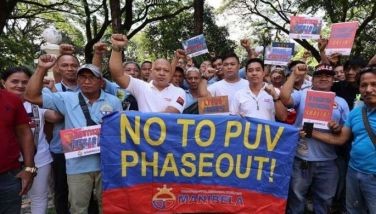Congress to focus on anti-trust, AMLA
MANILA, Philippines - The leaders of the Senate and the House of Representatives have agreed to work on passing the anti-trust bill, the third set of amendments to the Anti-Money Laundering Law (AMLA), and the human rights compensation bill as Congress resumes session today after almost a month’s break for the holidays.
Speaker Feliciano Belmonte Jr. and House Majority Leader Neptali Gonzales met with Senate President Juan Ponce Enrile, Senate Majority Leader Vicente Sotto III and Sen. Gregorio Honasan on Saturday to map out the pieces of legislation that will be prioritized in the remaining nine session days before going on a four-month adjournment on Feb. 9 for the midterm elections in May.
“There are a couple of bills I hope we could tackle. For instance, there is the anti-trust bill, which is still on second-reading consideration,†Belmonte said over the weekend. “In our conferences with local and foreign businessmen, the idea of an anti-trust law has always cropped up. And I don’t see any reason why we should not pass it. It’s something the country needs.â€
While the anti-trust measure is still pending, the House has already approved the AMLA amendments, which will now go to a bicameral conference committee.
Cagayan de Oro City Rep. Rufus Rodriguez, one of the authors of the anti-trust bill or the proposed Philippine Fair Competition Act, has urged President Aquino to certify the measure as urgent to expedite its approval.
“The proposed law seeks to penalize anti-competitive agreements, arrangements, practices, and mergers for a healthier business environment,†he said.
Rodrigeuz said there is “no major issue against it†and there is still time to pass the measure.
He pointed out that an anti-trust law would complement the economic reforms that have been undertaken by the Aquino administration and would boost growth.
“Definitely, such law will improve the business climate and encourage more foreign investors,†he said.
The proposed statute is patterned after similar legislation in the United States.
Under the bill, a Philippine Fair Competition Commission will be established to ensure that businesses do not abuse their “dominant position†and do not resort to uncompetitive and unfair arrangements and practices.
The commission will have the power to investigate “on its own initiative or upon the complaint of any person, any and all violations of this act and other competition laws and cause the issuance of a cease and desist order prior to the commencement of a preliminary inquiry, and/or the institution of a civil or administrative action.â€
The proposed law will prohibit cartels, which it defines as a “combination of firms, providing goods in relevant markets, acting or joined together to obtain a shared monopoly to control production, sale and price, or to obtain control in any particular industry or commodity, or a group of firms that agree to restrict trade.â€
Anti-competitive agreements may be either “horizontal†or “vertical.â€
Horizontal agreements are those “entered into between two or more enterprises operating at the same level in the market.â€
Vertical arrangements, on the other hand, are those made “at a different level of the production or distribution chain, and relating to the conditions under which the parties may purchase, sell or resell certain goods or services.â€
The bill also prohibits “price fixing,†which it defines as an “agreement among competitors to raise, suppress, fix or otherwise maintain the price at which their goods and services are sold.â€
AMLA faces rough sailing
However, Sen. Joker Arroyo vowed to block anew the third amendment to the AMLA, which will expand the list of predicate crimes to include tax evasion, malversation of public funds, terrorism and conspiracy to commit terrorism.
“Even if I lose, I will have to present this,†Arroyo said, as he expressed hope that Malacañang would not push for the passage of the measure.
Arroyo, in an interview with dzBB, also wondered why his colleagues would want to strengthen the power of the Anti-Money Laundering Council (AMLC) but not allow the imposition of penalties on banks in the country that accept deposits believed to be laundered or dirty money.
“In bribery, both the briber and bribed are guilty. It is the same with the banks,†Arroyo said in a radio interview, adding that there are provisions in AMLA that are defective, based on his research.
Senators Manny Villar, Ferdinand Marcos Jr. and Arroyo want to interpellate the measure.
Sen. Teofisto Guingona III, chairman of the Senate subcommittee on AMLA amendments under the committee on banks and financial institutions, has been urging his colleagues to pass the amendments before another review is undertaken this month by the Paris-based Financial Action Task Force (FATF) on anti-money laundering measures in the Philippines.
Arroyo reiterated that banks must also get a share of responsibility over deposits of dirty money.
“For example, Juan, he has dirty money, he will deposit it. AMLA will ask for a freeze order. Should the bank be penalized? That’s the question. AMLA said the banks should not be penalized. No money laundering will prosper if no bank will accept the money,†he argued.
Arroyo is also concerned that including tax evasion among the predicate crimes covered by the AMLA could be used as a political tool by the administration. He said that the AMLA and the Bureau of Internal Revenue (BIR) entered into a cooperation agreement sometime last year.
“If they freeze the amounts, the owner of dirty money will now deal either with AMLA or BIR. In America, tax evasion is not a predicate crime,†Arroyo said. “Why are we not following the American example, which is the same as the Canadian? Why are we following the FATF?â€
Arroyo pointed out that certain banks have been penalized for money laundering offenses or violations abroad in the United States from 2009 to 2012.
He cited HSBC, which was fined $1.9 billion; Chartered Bank, $667 million; ING, $619 million, and Credit Suisse, $536 million.
He added that Lloyds was fined $350 million, and Barclays, $298 million, while Wells Fargo, JP Morgan and Western Union were also slapped with fines in relation to money laundering violations.
“With a strong anti-money laundering law, the Philippines can follow suit even without making tax evasion a predicate crime,†Arroyo said.
In the US, Arroyo noted that banking regulators, such as the treasury department, federal reserve board and comptroller of currency, have been aggressive in the anti-money laundering campaign.
Senate Bill 3123 calls for the expansion of the list of “covered institutions†and the predicate crimes under the AMLA.
The bill calls for the inclusion of casinos, real estate agents, dealers in precious metals/stones, foreign exchange corporations, money changers and pre-need companies, among others, in the list of entities that have to submit periodic reports of large cash inflows to the AMLC.
It also proposes to expand the list of predicate crimes or unlawful activities to include terrorism, conspiracy to commit terrorism, bribery, fraud, illegal exactions and malversation of public funds.
- Latest
- Trending


























